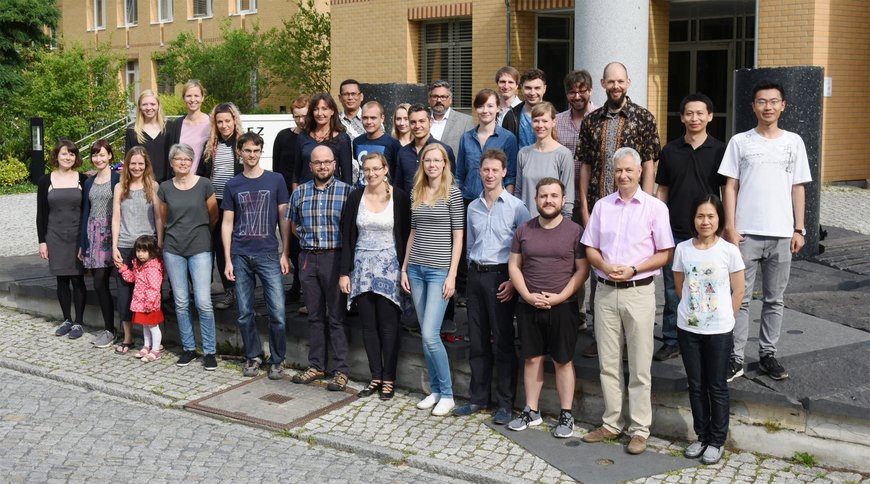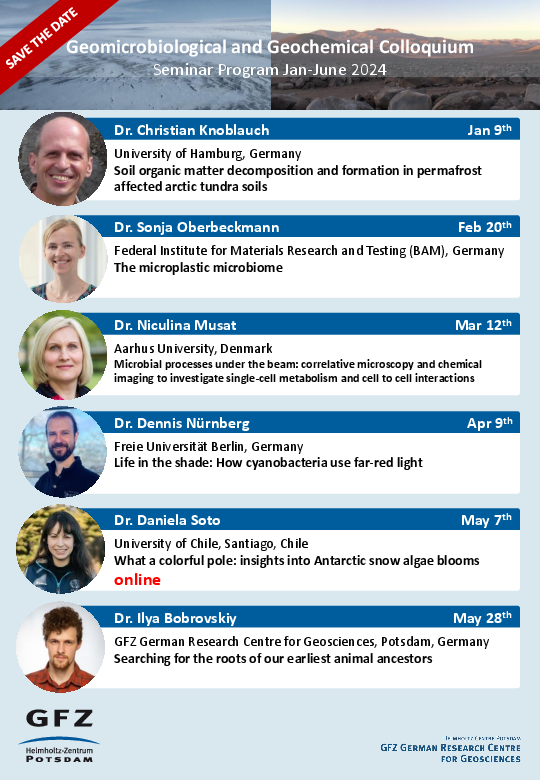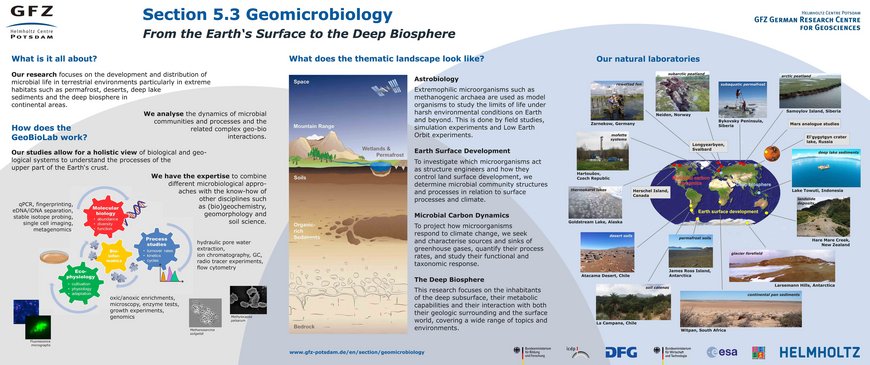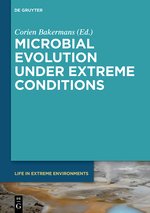From the Earth’s surface to the deep biosphere
The section Geomicrobiology investigates geomicrobiological processes both on the Earth’s surface including the critical zone and in the ’deep biosphere‘, which supposedly plays a fundamental role within the global biogeochemical cycles over short and long time scales. Our research focuses on the development and distribution of microbial life in terrestrial environments particularly in extreme habitats such as permafrost, deserts, lake sediments and the deep subsurface in continental areas. We analyse the dynamics and processes of microbial communities and the related complex geologic-biological interactions.
We established the novel Helmholtz Laboratory for Integrated Geological and Biological Research (GeoBioLab) as an interdisciplinary platform for joint activities of scientists from various disciplines including microbiology/molecular biology, (bio)geochemistry, bioinformatics, and geomorphology to address our scientific questions in a wide range of environments and disciplines. In addition to basic research, we also work on translating suitable results into applications. These include, for example, the development of equipment for sediment sampling and sample preparation or the utilization of the genetic resources represented by our unique type culture collection of extremophilic microorganisms for industrial or biotechnological applications.
Members of section Geomicrobiology are also actively involved in the transfer of scientific discoveries, achievements, and know-how to entrepreneurial and business applications. Recently, the GreenGate Genomics project was started as part of the Helmholtz Enterprise Initiative. This currently developing spin-out project offers bioinformatic services, software, and support in the areas of environmental and molecular microbiology. Please visit https://greengategenomics.com for more information.
The Section Geomicrobiology focuses on four main topics:
- Microorganisms as engineers for the Earth’s surface development: Understanding the mechanisms and processes of shaping the Earth's surface is fundamental to life on Earth. Microorganisms play a key role for the development of sediments and soils, and suggest, therefore, their enormous potential to shape the terrestrial Earth surface in close interrelation with climate and tectonic forces. Our research includes studies on microbial weathering, nutrient accumulation and turnover and initial soil formation processes.
- Microbial carbon dynamics in the climate system: Microbial communities of the terrestrial surface and subsurface drive the formation and consumption of the greenhouse gases (GHG) CO2 and CH4. They are thus key reagents of climate-induced feedbacks on our Earth surface capable both of accelerating and mitigating Global Change. For projecting how microbes react and adapt to climate change, we seek and characterize microbial sources and sinks of GHG, quantify their process rates, and study their functional and taxonomic response in space and time.
- The deep biosphere: The pore space in sediments and fractures in hard rocks form a vast ecosystem that spans around the entire planet. Despite its gigantic size we still have very little knowledge about the inhabitants, their metabolic capabilities and their interaction with both their geologic surrounding and the surface world. Our research focuses on several aspects of the deep biosphere, covering a wide range of topics and environments including lakes, deep subseafloor habitats, terrestrial gas seeps and permafrost.
- Astrobiology - Habitability and biosignatures: Extreme habitats on Earth with expected analogs on other planets and moons in our solar system play an important role in astrobiological research. The particular focus of the geomicrobiological work at the GFZ is on habitability studies and determing biosignatures. This includes, for example, habitats that are characterized by extreme drought and/or cold such as the Atacama Desert in Chile, ice-free oases in Antarctica or Arctic permafrost (see also Topics 1-3). Model organisms from these environments are used to study the limits of life under harsh environmental conditions. This is done by field studies, simulation experiments and Low Earth Orbit experiments on the International Space Station (ISS).
Geomicrobiological and Geochemical Colloquium
7th May 2024 - SEMINAR CANCELLED
"What a colorful pole: insights into Antarctic snow algae blooms"
Dr. Daniela Soto, University of Chile, Santiago, Chile
Awards
MSc. Ebuka Canisius Nwosu received an award for the best poster at the Annual Conference 2019 of the Association for General and Applied Microbiology (VAAM), 17 - 20 March 2019, Mainz, Germany
https://www.facebook.com/vaam.de/photos/a.1649890918613967/2309682989301420/?type=3&theater
MSc. André Friese received the “ISSM best student oral presentation” award at The international Society for Subsurface Microbiology (ISSM) Conference 2017 (6-10 November 2017) in Rotorua, Newzealand. Title of the talk: „A simple and inexpensive technique for assessing contamination during drilling operations.“, 09.11.2017
Expedition Atacama 2018
The Section Geomicrobiology will conduct an expedition to the Atacama Desert in Chile from 14-30 March 2018 together with partners from the Technical University Berlin (TUB) and the German Aerospace Center (DLR). The aim of this campaign is to explore the limits of life in extremely dry conditions and the impact of microorganisms on the development of the desert habitat.
Book series
Life in Extreme Environments (editor-in-chief D. Wagner)
Volume 7 on the subject "Microbial Life in the Cryosphere and its Feedback on Global Change" (Susanne Liebner, Lars Ganzert (Eds.) was published by De Gruyter Verlag, Berlin/Bosten, in January 2021.







